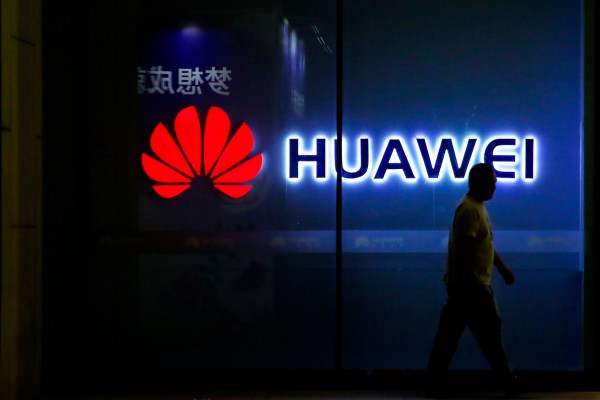Ratcheting up its pressure campaign against Huawei and its affiliates, the Department of Justice and the FBI announced today that it has brought 16 charges against Huawei in a sprawling case with major geopolitical implications (you can read the full 56-page indictment here).
Huawei is being charged with conspiracy to violate the Racketeer Influenced and Corrupt Organizations Act (RICO) statute. The DoJ alleges that Huawei and a number of its affiliates used confidential agreements with American companies over the past two decades to access the trade secrets of those companies, only to then misappropriate that intellectual property and use it to fund Huawei’s business.
An example of this activity is provided in the indictment. Described as “Company 1,” Huawei is alleged to have stolen source code for Company 1’s routers, which it then used in its own products. Given the context, it is highly likely that Company 1 is Cisco, which in the indictment is summarized as “a U.S. technology company headquartered in the Northern District of California.”
Huawei is also alleged to have engaged in more simple forms of industrial espionage. While at a trade show in Chicago, a Huawei-affiliated engineer “… was discovered in the middle of the night after the show had closed for the day in the booth of a technology company … removing the cover from a networking device and taking photographs of the circuitry inside. Individual-3 wore a badge listing his employer as ‘Weihua,’ HUAWEI spelled with its syllables reversed.” Huawei said that the individual in question did so in a personal capacity.
In one case, a technology company looking for a partnership with Huawei sent over a presentation deck with confidential information about its business in order to generate commercial interest with Huawei. From the indictment:
Immediately upon receipt of the slide deck, each page of which was marked ‘Proprietary and Confidential’ by Company 6, HUAWEI distributed the slide deck to HUAWEI engineers, including engineers in the subsidiary that was working on technology that directly competed with Company 6’s products and services. These engineers discussed developments by Company 6 that would have application to HUAWEI’s own prototypes then under design.
Together, the indictment lists multiple examples of Huawei’s alleged conspiracy to pilfer U.S. intellectual property.
According to the statement published by the Department of Justice, “As part of the scheme, Huawei allegedly launched a policy instituting a bonus program to reward employees who obtained confidential information from competitors. The policy made clear that employees who provided valuable information were to be financially rewarded.” Per the indictment:
A ‘competition management group’ was tasked with reviewing the submissions and awarding monthly bonuses to the employees who provided the most valuable stolen information.
In addition to conspiracy, Huawei and the defendants are charged with lying to federal investigators and obstructing the investigation into the company’s activity. Per the indictment:
For example, an official HUAWEI manual labeled ‘Top Secret’ instructed certain individuals working for HUAWEI to conceal their employment with HUAWEI during encounters with foreign law enforcement officials.
Furthermore, Huawei has been charged in connection with its activities in countries like Iran and North Korea. The DoJ’s statement alleges that Huawei used code words and carefully selected local partners to conceal its activities in these states in order to avoid international sanctions that are placed on the two countries. It also alleges that the company and its representatives lied to congressional investigators when asked about the company’s financial activities in the two countries.
Among the defendants is Meng Wanzhou, the CFO of Huawei who has been under house arrest in Canada while facing charges of fraud.
The top two senators on the Senate Select Committee on Intelligence, Richard Burr (R-NC) and Mark Warner (D-VA) said in a joint statement that “The indictment paints a damning portrait of an illegitimate organization that lacks any regard for the law.”
Huawei, in response to the indictment, said in a corporate statement that “This new indictment is part of the Justice Department’s attempt to irrevocably damage Huawei’s reputation and its business for reasons related to competition rather than law enforcement. The ‘racketeering enterprise’ that the government charged today is nothing more than a contrived repackaging of a handful of civil allegations that are almost 20 years old and that have never been the basis of any significant monetary judgment against Huawei. The government will not prevail on these charges which we will prove to be both unfounded and unfair.“
The Trump administration has made targeting Huawei a major priority, attempting to block its access to Western markets. The administration’s efforts have mostly been fruitless thus far, with both the United Kingdom and Germany in recent weeks allowing the company’s technology products into their telecommunications networks. We have more coverage on these initiatives in an article TechCrunch published this morning:
The full list of defendants include Huawei Technologies Co., Ltd.; Huawei Device Co., Ltd.; Huawei Device Usa Inc.; Futurewei Technologies, Inc.; Skycom Tech Co., Ltd.; and Wanzhou Meng.
Huawei representatives didn’t immediately respond to a request for comment.
Updated 1:45pm EST to include additional details from the indictment.
Updated 4:45pm EST to include comments from Huawei
